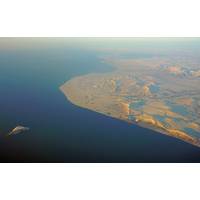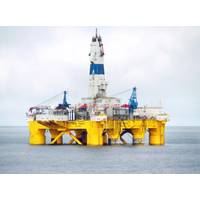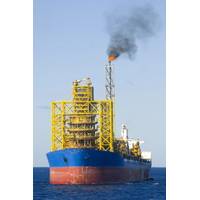Alaska Requests Limits on US Offshore Drilling

Alaska Governor Bill Walker said on Tuesday he has asked U.S. Interior Secretary Ryan Zinke to pare back a Trump administration plan for oil and gas leasing off the state's coast. While Walker supports offshore oil development, he said the Interior Department should focus on the most prospective areas off Alaska – the Beaufort and Chukchi seas in the Arctic and Cook Inlet in southern Alaska – and drop all others from the leasing plan. In asking for proposed lease sales to be dropped, Walker, an independent…
Gas Pipeline Leak Repairs Begun in Cook Inlet
Divers have begun repairing a leak from an 8-inch natural gas pipeline in the Middle Ground Shoal area in Alaska's Cook Inlet, Hilcorp Energy Co said on Monday. Endangered beluga whales and other marine mammals live in the inlet. The company shut two Alaskan oil production platforms two weeks ago after reducing pressure on a leaking natural gas pipeline in Cook Inlet. At the reduced rate, the leak is estimated to be around 85 to 115 thousand cubic feet per day, the company said in late March. Hilcorp said divers, who began the work on Friday, found the leak and were preparing to install a temporary clamp to stop it.
BOEM : Potential Cook Inlet Lease Sale
The Bureau of Ocean Energy Management (BOEM) today announced it plans to offer approximately 1.09 million acres in Cook Inlet off Alaska’s southcentral coast in a proposed lease sale this year. Cook Inlet Oil & Gas Lease Sale 244, scheduled to take place in June 2017, would offer 224 blocks toward the northern part of the Cook Inlet Planning Area for leasing. The blocks stretch roughly from Kalgin Island in the north to Augustine Island in the south. “Following a robust environmental analysis, we are moving forward with the Lease Sale 244 process,” said Walter Cruickshank, BOEM’s acting director.
Offshore O&G Leasing Plan for 2017-2022 Announced
After considering more than 3.3 million public comments and holding 36 public meetings, U.S. Secretary of the Interior Sally Jewell and Bureau of Ocean Energy Management (BOEM) Director Abigail Hopper today released the final plan to guide future energy development for the Nation’s Outer Continental Shelf (OCS) for 2017-2022. The plan takes a balanced approach to best meet the nation’s energy needs by including areas offshore with high resource potential and mature infrastructure while protecting regions with critical ecological resources.
Obama Administration Bars New Oil, Gas Exploration off Alaska

The Obama administration on Friday blocked new exploration for oil and gas in Arctic waters, in a win for environmental groups that had fought development of the ecologically fragile region. The Department of the Interior released a 2017 to 2022 leasing plan that blocked drilling in the Chukchi and Beaufort Seas off northern Alaska. It also limited petroleum development in the Cook Inlet off south-central Alaska. Environmental activists have battled drilling in Alaska to protect whales, walruses and seals, and as part of a broader movement to keep remaining fossil fuels in the ground.
NOIA: Maximum Access Offshore Leasing Program
NOIA President Randall Luthi joined API Group Director of Upstream and Industry Operations Erik Milito and IAGC COO and Executive Vice President Walt Rosenbusch today in calling for a maximum access 2017-2022 Offshore Leasing Program that includes the Atlantic OCS to further our nation’s position as the global energy leader, strengthen our economy, and keep energy affordable for American consumers. “To remain the world’s leading energy producer, the U.S. needs a two pronged approach. First, a broad range of energy sources, both traditional and nontraditional; and second, a broad geographical location of those resources.
US Proposes Allowing Oil, Gas Drilling off Atlantic Coast
The Obama administration on Tuesday proposed allowing for the first time oil and gas exploration in a wide swath of U.S. waters off the Atlantic Coast. The 2017 to 2022 drilling plan begins a process that could take many years before waters off the coasts of Virginia, North Carolina, South Carolina or Georgia are cleared for drilling. It expands on the last five-year plan initially issued in 2010 that allowed drilling off Virginia. The administration canceled a lease sale there after BP Plc's deadly explosion and oil spill in the Gulf of Mexico that year.
A History of U.S. Oil Export Controls

On Oct. 20, 1973, King Faisal of Saudi Arabia imposed a total embargo on oil shipments to the United States among other countries in response to their support for Israel during the Arab-Israeli war. Faisal's decision led directly to the introduction of a ban on U.S. crude exports, which remains in force in a slightly modified form and is now the focus of an intense struggle for reform. Following the U.S. mid-term elections next month, Congress will take up the issue again, a debate that would benefit from an understanding of the history behind the ban. On Oct.
Fire Aboard Alaska Natural Gas Platform
The U.S. Coast Guard launched several assets in response to a report of a fire on board a natural gas drill platform in Cook Inlet Thursday. The Coast Guard diverted a Coast Guard Hercules HC-130 crew and an MH-60 Jayhawk helicopter crew to conduct an overflight of the Baker Platform in Cook Inlet, near Nikiski. The Coast Guard also launched the Coast Guard Cutter Mustang and the diverted the Coast Guard Cutter SPAR to the location. A five-mile, no-fly safety zone at 5,000 feet and a two-mile safety zone have been established around the platform. All four people aboard the platform were safety evacuated.
Design Work to Start on New Alaska LNG Project

The state of Alaska and four energy firms have signed a joint-venture agreement to begin preliminary work on an 800-mile natural gas pipeline from the North Slope to a liquefied natural gas (LNG) export plant, Governor Sean Parnell said Wednesday. The agreement calls for partners to invest millions in so-called front-end engineering and design work over the next 18 months for the project, which could ultimately cost between $45 billion and $65 billion. The agreement comes two months after the state's legislature backed Parnell's plan to work with North Slope leaseholders Exxon Mobil…
US Crude Oil Exports at 15-year High
Crude oil exports from the United States were 268,000 barrels per day in April, the highest in 15 years, with almost all of the oil delivered to Canada, the U.S. Energy Information Administration said on Monday. Exports have increased sharply since the start of 2013 and have exceeded 200,000 bpd in five of the past six months. The EIA, the statistical arm of the U.S. Department of Energy, said the increase was largely the result of sharply rising U.S. crude production. Congress banned most U.S. crude oil exports after price shocks from the 1973 Arab oil embargo led to the notion that the United States was running out of oil.
Alaska Plan To Export North Slope Gasp
Alaska's legislature on Monday approved Governor Sean Parnell's plan to join four energy companies in moving ahead on plans to build infrastructure to transport and market 35 trillion cubic feet of North Slope gas to be shipped by an 800-mile pipeline to a liquefied natural gas (LNG) export plant. The project is valued at between $45 billion and $65 billion for the line and gas treatment facilities. Should it come to fruition, gas could hit local and foreign markets in the mid-2020s, according to the state's projections. Companies are increasingly seeking to ship LNG from growing U.S.
